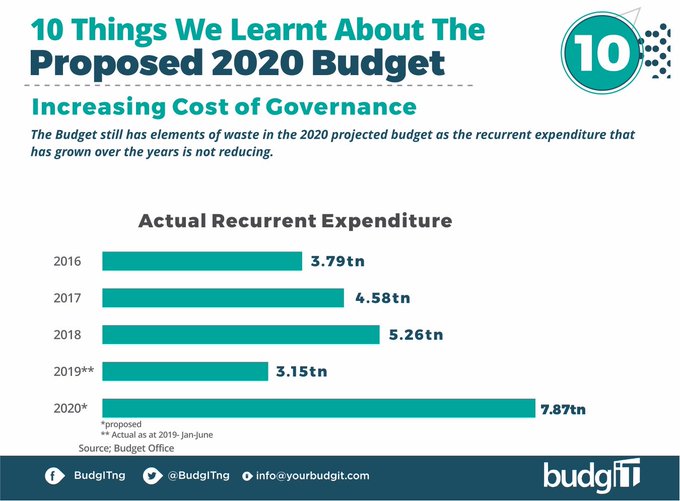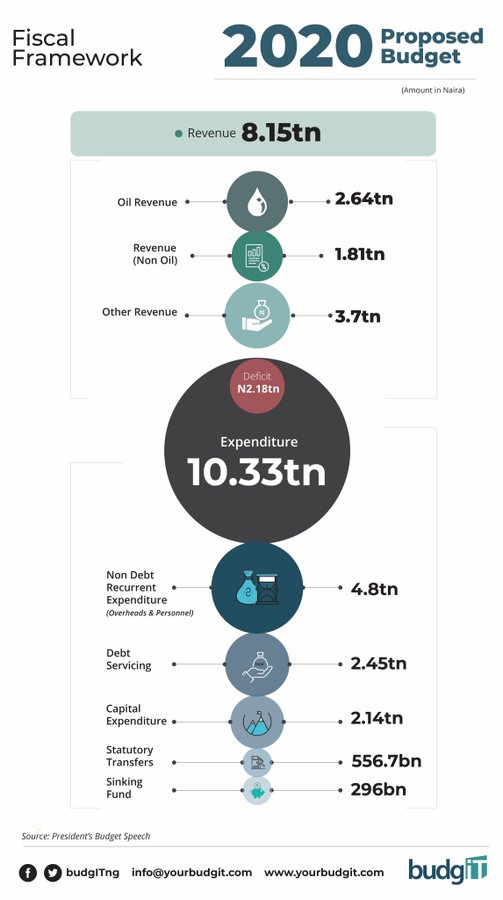By Eromo Egbejule
As Nigeria's
debt continues to rise amidst declining oil revenues, analysts are warning that
the country must cut its coat according to the available cloth.
“If annual debt service cost is 110% of govt
revenue, FG must implement the Oronsanye [sic] Report & cut down [the] size
of government”, tweeted Ayisha Osori, executive director for the Open Society
Initiative for West Africa.
If annual debt service cost is 110% of govt revenue, FG must implement the Oronsanye Report & cut down size of govt - not increase ministers from 36 to 42; not create new MDA.
Foreign trips & estacodes are the tip of the iceberg; a lot more sacrifice required from govt.
165 people are talking about this
The civil society leader’s comments are
the latest in a set of warnings by concerned stakeholders over the past few
months.
In June 2019, former central bank governor
Sanusi Lamido Sanusi warned that the country was on the verge of bankruptcy,
saying that fuel subsidies have entrenched underdevelopment and is
boosting poverty.
“What happened is that the Federal Government
pays petroleum subsidy, pays electricity tariff subsidy, and if there is a rise
in interest rates Federal Government pays”, the former governor, now Emir of
Kano, told the National Treasury Workshop. “[…]
If truly President [Muhammadu] Buhari is fighting poverty, he should remove the
risk on the national financial sector and stop the subsidy regime, which is
fraudulent.”
Pruning government
While government costs and debts are piling
up, Africa’s largest economy continues to operate a large government.
Between 2015-2018, Nigeria spent N6.46trn
($17.84bn) to service debts, according to numbers from the Debt Management
Office (DMO).
A May 2019 presentation by finance
minister Zainab Ahmed revealed that two-thirds of revenues due to federal
government after allocation to the states and local governments goes into
servicing Nigeria’s debt obligations.
In 2018, N2.15trn was spent servicing debt and
a similar amount has been earmarked for 2019. For 2020, N2.45trn is
budgeted for servicing debt.
Beyond that, the cost of governance is
also on a steady rise.
A breakdown by BudgIT, a frontline nonprofit
advocating for transparency and fiscal accountability of governments across
West Africa, shows that recurrent expenditure has increased year-on-year since
2016 and a record N7.8trn is budgeted for it in 2020.
In the 2020 proposed budget, the federal government has projected the sum of N2.45tn to service debt which is about 23.7% of the total expenditure. Nigeria now spends more debt servicing than capital expenditure. #BudgITExplains #2020BudgetNG
10. The Budget still has elements of waste in the 2020 projected budget as the recurrent expenditure that has grown over the years is not reducing. However, several capital items in the budget are not specific neither are they needed considering the revenue crunch.
15 people are talking about this
Projected non-debt recurrent expenditure (overheads and personnel) for 2020, is N4.8trn.
President @MBuhari today presented to a joint session of @nassnigeria an Expenditure Budget of N10.33tn, with N8.15tn projected as revenue and deficit (borrowing) of N2.18tn.
We shall bring you more details. #Budget2020NG
126 people are talking about this
After winning re-election in February 2019, President
Buhari announced a 43-man cabinet in August of the same year. Four years ago,
he had reduced the overall number of ministers from 42 to 36 and
streamlined the ministries to 25.
The members of the new cabinet supervise a
largely redundant civil service which continues to accumulate salaries and
hike the cost of salaries and overheads in the annual budget, on a yearly
basis.
Bottom of Form
Civil servants, especially the
retinue of government advisers, make up a bulk of the large delegations that
accompany members of the executive at federal and state levels on a plethora of
foreign trips. There are also frequent allegations of ‘ghost workers’ in the
service, a term for nonexistent workers whose salaries go down on the balance
sheet.
The Oronsaye report is an 800-page report
submitted to Buhari’s predecessor, Goodluck Jonathan, by Stephen Oronsaye, a
former head of the civil service and head of a committee constituted by the
then-president to tackle civil service reforms. It called for a shrinkage
of government, with as many as 102 parastatals and agencies recommended for
scrapping. The report, which also called for an audit of selected government
agencies, has never been implemented to this day.
Back in 1999, another committee with a
similar mandate was established under the leadership of another former
civil service head, Ahmed Joda. It made similar recommendations to both the
Oransaye report and an earlier one – the Allison Ayida committee of 1995.
In what is hopefully an indication of more to
come, Buhari ordered a forensic audit of the Niger Delta Development Commission
(NDDC)‘s operations from 2001 to 2019. Established under the
Olusegun Obasanjo administration to trigger development in the oil-rich region,
the commission has for years had the reputation of a corrupt institution and is
widely believed to have become a cash cow for funding elections in the Delta.
But that is only a drop in the ocean.
Why this is important: Talk
of reducing the size and cost of governance has gone on in Nigeria’s corridors
of power for decades but has remained just that – talk. There is no better time
than now for Nigeria to walk the talk and prune its government and pinch the
pennies to be able to deliver dividends of democracy to its citizens.








No comments:
Post a Comment